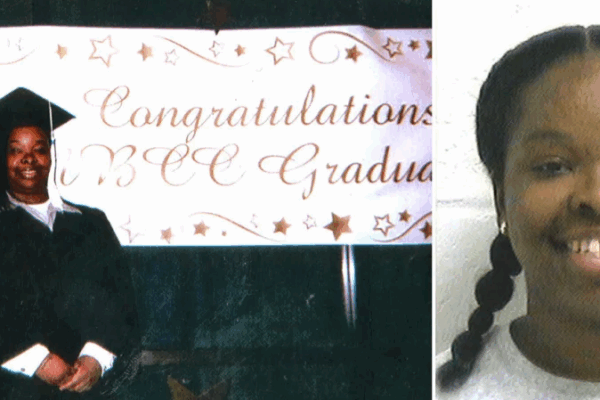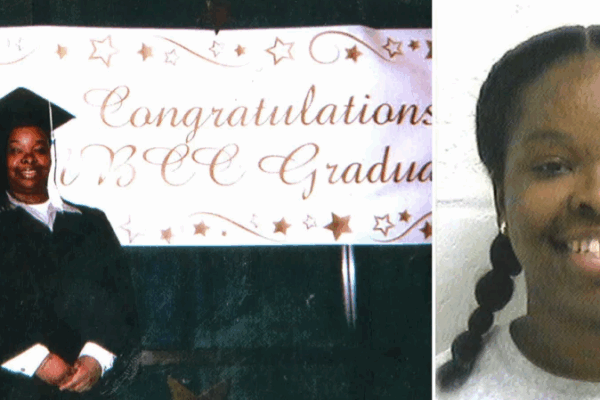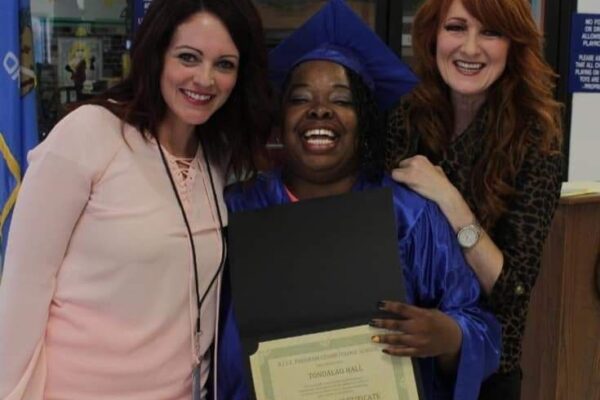Who is Tondalao Hall?
- Tondalao Hall is a 33-year-old woman of color and mother of three from Oklahoma City. She is currently serving her 13th year of a 30-year prison sentence for “failure to protect” her children from her abuser, Robert Braxton. She lived with her abusive partner since their first child was born when Tondalao was 16 years old, and in their time together Tondalao became increasingly more isolated from her friends and family. After enduring her boyfriend’s abuse for years, Tondalao was actively working on a way to leave him safely. Then at 19, Tondalao was arrested upon bringing her children to a local hospital with broken bones caused by Braxton’s abuse.
Why is Tondalao Hall still in prison?
- In 2006 Tondalao Hall was harshly sentenced under a “failure to protect” law which penalized her much more harshly than her abusive partner. Robert Braxton, the father of the children and actual abuser, was sentenced to eight years of probation. The next month, Tondalao Hall was sentenced by the same judge to two consecutive 15-year sentences for failing to stop him.
- Tondalao has previously appealed her case twice, requesting the courts to modify her excessive sentence through both a direct appeal and through an application for post-conviction relief, but she lost each of these appeals.
- Supported by numerous community advocates and activists, Tondalao also tried unsuccessfully to seek clemency from the Oklahoma Pardon & Parole Board, which denied her request despite the glaringly obvious injustice of her sentence.
- Due to Oklahoma’s 85% sentencing laws, Tondalao will not be eligible for release on parole until approximately the year 2029.
Why did the ACLU file this case in Pottawatomie County instead of Oklahoma County?
- ACLU attorneys have filed what is called a Writ of Habeas Corpus- which is a means of writing a wrong when other legal options have failed. By court rule, cases like this one must take place in the county where the convicted individual is held, rather than where she was tried because a writ of habeas corpus demands that the state justify why the prisoner remains in custody.
Will Tondalao Hall go free on December 12?
- Probably not. The likelihood of this first hearing being the end of her struggle is incredibly slim. This challenge was created in such a way that this hearing is only step one of a long process. Habeas petitions are used to remedy an injustice where all other means have failed, and both Tondalao and the ACLU are in it for as long as it takes, even if we have to take Tondalao’s case all the way to the U.S. Supreme Court.
What will happen at this hearing?
- Of course, no one can predict what a judge will do or say after receiving all the information contained in a filing. We can, however, summarize the most likely possible outcomes:
- Option 1) the Judge will find that he does not have jurisdiction (meaning he does not have the authority to hear the case), which actually helps Tondalao have the ability to pursue a new post-conviction relief application in Oklahoma County that we would file within a few days and that would result in a new hearing;
- Option 2) the Judge will find that he can hear the case but does not issue a decision on the 12th, instead taking more time to evaluate the claims and review evidence, then issuing a decision or having a further hearing on a later date;
- Option 3) the Judge will find that he can hear the case, reviews the evidence, but then denies Tondalao’s claims for relief, which gives us authority to appeal his decision to the Court of Criminal Appeals and then to the US Supreme Court if necessary;
- Option 4) the Judge will find that he can hear the case and grants Tondalao relief from her excessive sentence, at which point we expect the State to appeal.
What happens after the hearing?
- Tondalao’s legal team has carefully crafted a series of actions in response to each possible outcome on December 12. Our next action depends on the ruling handed down on the 12th, but options one and two listed above are far more likely because of the complex nature of this petition. Should the Judge either find that he cannot hear the case or deny Tondalao relief from her excessive sentence, we will appeal that decision to a higher court. Any outcome short of freeing Tondalao will be met with further persistent pursuit of her freedom.
- We are also planning to pursue a renewed and more strongly-supported request for clemency to the Oklahoma Pardon and Parole Board, though we have not set an exact date for filing as we are still putting together new supporting materials. This process is separate from the court case and worth pursuing to improve Tondalao’s chances of release regardless of what happens in court.
Is there anyone who can do something immediately?
- Yes. Oklahoma County District Attorney David Prater has considerable influence over what may happen to Tondalao and could take immediate actions that likely would result in her quick release. Though DA Prater was not the prosecutor at the time of Tondalao's sentencing, as the current prosecutor in the county of her original case he could have a great deal of influence on her release. He could do this either by simply agreeing (or not objecting) to what we are seeking in Tondalao’s current court case, or by agreeing to allow an agreed request for sentence modification to be filed outside the period of time in which it is usually allowed. This modification could either shorten Tondalao’s sentence outright or change the remainder of it into a probation. David Prater, therefore, remains the one public official who could impact this case the most. So far, he has declined to help and has made public comments continuing to blame Tondalao for her abuser’s crimes and to defend her wildly disproportionate sentence
Why did the Attorney General file a motion to dismiss?
- A motion to dismiss is an exceedingly common tool for anyone opposing a lawsuit or petition before a court. By filing a motion to dismiss, the Attorney General’s Office asks the Court to decline to hear the merits of Toni’s case on December 12. This motion also asks to strike the hearing, which is a normal part of a request to dismiss.
- The ACLU of Oklahoma filed a response to the Attorney General’s motion to dismiss, contesting the relevance of the legal authorities to which they cite. The Court has not granted or denied either motion yet. We expect to argue against this motion before the Court on Tuesday.
- As discussed above, we have strategically set up Tondalao’s case so that either way the judge rules, Tondalao retains the ability to continue to bring her case and preserve her ability to appeal on her unconstitutional sentence.
Do “failure to protect” laws impact very many people?
- Unfortunately, yes. There are lots of people across several states currently serving time under “failure to protect” laws. When leaving abusive relationships, the victim’s likelihood of being murdered by a partner jumps to about 75% higher than if they choose to remain in the relationship. Leaving an abusive partner is dangerous for both abuse victims and children and these laws disregard that risk altogether. These types of prosecutions are disproportionately targeted at women and often can carry longer sentences than the actual abuser will receive. While Tondalao’s situation is nothing short of heartbreaking and is a particularly egregious example, sadly, it is not rare.
UPDATED
What happened at the December 12 trial?
- A judge in Pottawatomie County dismissed the ACLU’s first petition, but this fight is far from over.
- Navigating the law through courts, simply put, is a tedious process and procedure is important. While we knew this dismissal was a possibility, it was the right way to begin this process. This dismissal is not a loss for Tondalao. Rather it is a necessary step in what we knew would be a long journey through the legal system.
What happens now that the petition was dismissed?
- A post-conviction application will be filed in Oklahoma County. Tondalao and her attorneys remain hopeful that a more just future is possible.
What are the takeaways from the recently released video of D.A. David Prater discussing Tondalao’s case?
- Recently, at a public forum on criminal justice reform D.A. Prater commented on Tondalao’s original prosecution and sentencing, giving a room full of people inaccurate and inconsistent information about Tondalao. Prater’s comments on the trial are wildly inconsistent with court records.
- Prater did say one thing that we fully agree with: Women in Oklahoma are treated poorly. While we are glad David Prater recognizes the institutional sexism perpetuated through our laws and legal system, Prater himself is participating in that poor treatment. Prater has the opportunity to make a change and reunite Tondalao with her children, but he has so far refused to do so. His calls for reform ring hollow while unaccompanied by action.




